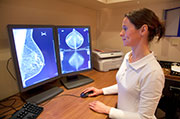- Double Mastectomy May Offer No Survival Benefit to Women With Breast Cancer
- Toxic Lead Found in Cinnamon Product, FDA Says
- Certain Abbott Blood Sugar Monitors May Give Incorrect Readings
- Athletes Can Expect High Ozone, Pollen Counts for Paris Olympics
- Fake Oxycontin Pills Widespread and Potentially Deadly: Report
- Shingles Vaccine Could Lower Dementia Risk
- Your Odds for Accidental Gun Death Rise Greatly in Certain States
- Kids From Poorer Families Less Likely to Survive Cancer
- Tough Workouts Won’t Trigger Cardiac Arrest in Folks With Long QT Syndrome
- At-Home Colon Cancer Test Can Save Lives
Obesity, Smoking Might Threaten Implants After Mastectomy


Obesity and smoking increase the risk of implant failure in women who undergo breast reconstruction soon after breast removal, according to a new study.
Researchers analyzed data from nearly 15,000 women, aged 40 to 60, who had immediate reconstruction after breast removal (mastectomy). They found that the risk of implant loss was three times higher in smokers and two to three times higher in obese women.
The more obese a woman, the greater her risk of early implant failure, according to the study, which was published in the December issue of the Journal of the American College of Surgeons.
Other factors associated with a higher risk of implant loss included being older than 55, receiving implants in both breasts, and undergoing both breast removal and reconstruction with implants in a single operation.
“Less than 1 percent of all patients in our study experienced [implant failure],” study lead author Dr. John Fischer, a plastic surgery resident at the Perelman School of Medicine at the University of Pennsylvania, said in a journal news release. “But when we [organized] patients into low-, intermediate- and high-risk groups, the risk went from 0.39 percent to 1.48 percent to 3.86 percent.”
“It may seem like a small difference, but the difference is clinically significant because it means that one in 25 patients in the high-risk group will lose a device within 30 days,” he said.
The researchers also created a risk-scoring tool to help surgeons counsel patients about their predicted risk for early implant loss.
If a patient learns she has a high risk for complications with breast implants, she may choose to have an autologous tissue-based procedure, Fischer said. In autologous breast reconstruction, surgeons create a new breast by using a woman’s own tissue, which is often taken from her abdomen.
“The expectations are better managed and overall satisfaction is likely to be higher,” Fischer said.
More information
The American Cancer Society has more about breast reconstruction after mastectomy.
Source: HealthDay
Copyright © 2024 HealthDay. All rights reserved.










